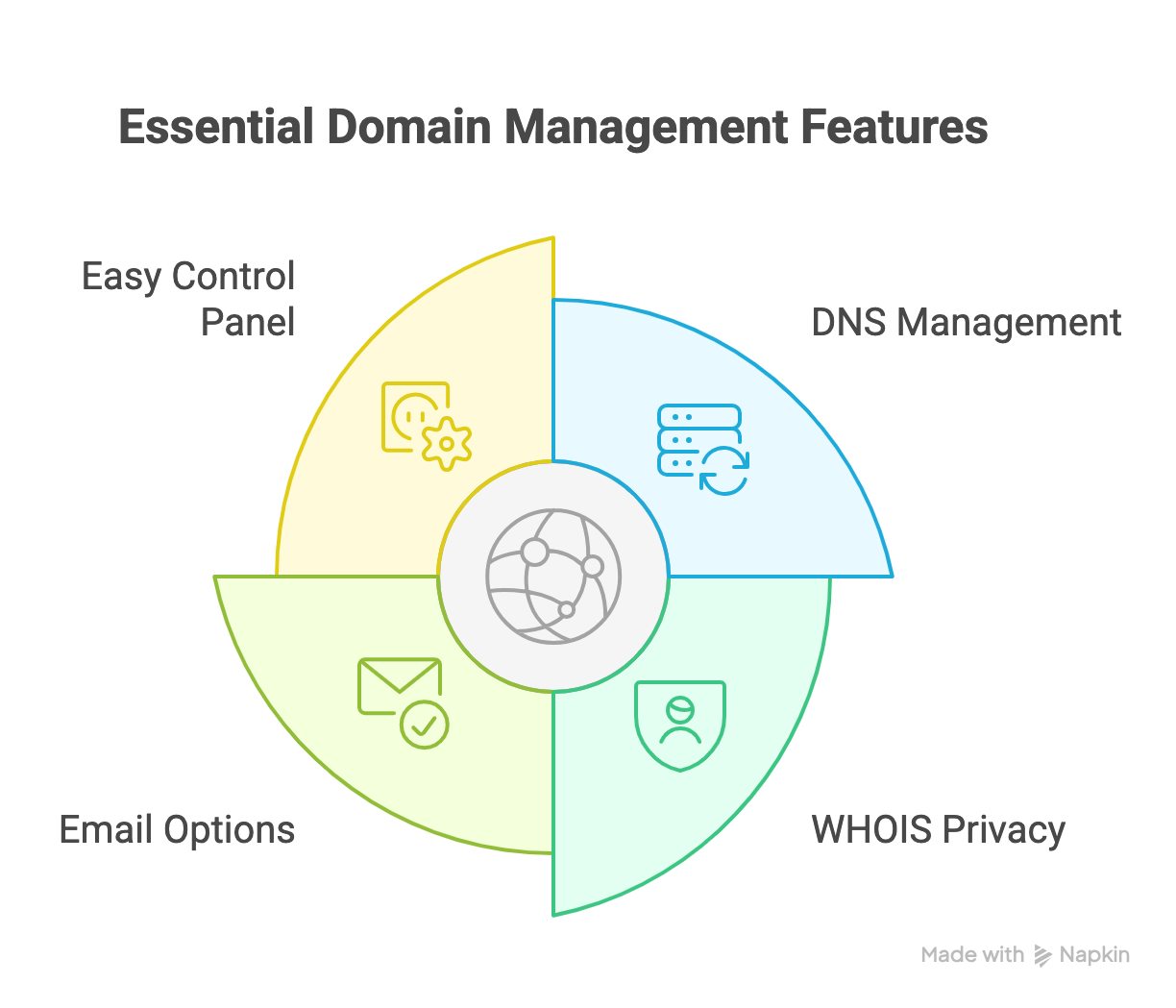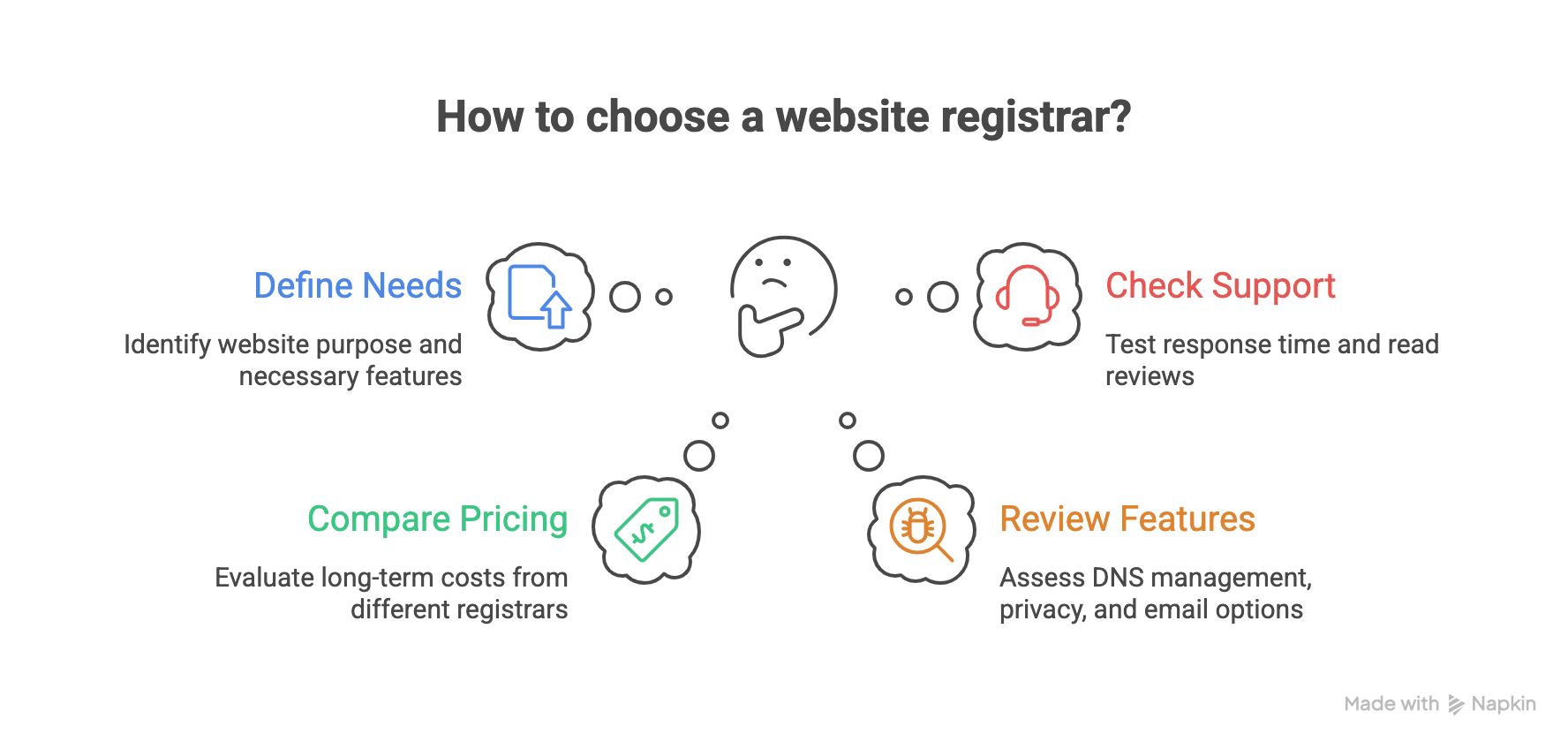A domain registrar is a company that handles the reservation and management of website names. When you buy a domain, the registrar records you as the owner and provides tools to manage your DNS settings, connect your domain to hosting, set up email, and keep your information up to date.
Without a registrar, your website name would have no place to be officially stored or controlled.
Choosing the right registrar matters more than you think, because pricing, renewals, support quality, and included features vary widely. Let’s see what to watch out for when choosing a domain registrar, and how to find the best fit for you!
Before You Compare Registrars: Define Your Needs
Before comparing registrars, think about what you need from your domain.
Start with the purpose of the site:
- A business website needs stronger security, reliable support, and extra services.
- A personal blog or portfolio might only require basic management.
- An online store may need features like SSL certificates and strong DNS performance
Next, set a realistic budget. Look at both first-year price and the renewal cost, since some registrars increase fees later. If you plan to add email, privacy protection, or extra domains, note these expenses as well.
Think about your long-term plans. If you expect your project to grow, choose a registrar that makes it easy to transfer domains, upgrade services, or manage several domains in one place.
Planning ahead helps you avoid switching providers or facing higher costs later.
Core Criteria to Compare When Choosing a Domain Registrar
Pricing and renewal costs
Start by checking the initial registration price. Some registrars offer low first-year rates to attract new users, but the cost increases when the domain renews. Review the renewal price carefully, since this is the amount you will pay every year.
Look at transfer fees as well. If you decide to move your domain to another registrar in the future, you may need to pay a fee. Some providers waive the cost, while others charge extra. Comparing these three elements will help you understand the real long-term cost of owning your domain.
Feature set and tools
DNS management is an essential feature. It lets you control where your domain points so you can connect it to hosting, email, or other services. Good DNS management should be reliable and easy to update.
WHOIS privacy hides your personal contact details from public records. Some registrars include this at no extra cost, others charge a yearly fee. Check this early to avoid surprise costs.
Many registrars offer email options. This can include simple forwarding or full inbox services. If you want professional email at your domain, confirm what is included and what requires an upgrade.
An easy control panel helps you manage your domain without confusion. Look for a clean dashboard where you can update DNS, renew your domain, and manage privacy settings without extra steps.

Support quality
Availability is very important. Some registrars provide 24/7 help through live chat or tickets, while others offer limited hours. Choose support that matches your needs.
Response quality also matters. Fast replies are helpful, but answers must also be clear and accurate. Look for reviews that mention helpful service and good-problem solving.
Security measures
Security protects your domain from unauthorized access or transfer. The most important feature is two-factor authentication. This adds an extra verification step when logging in, which helps prevent someone from getting into your account even if they know your password.
Domain locking is another core layer of protection. When your domain is locked, it cannot be transferred to another registrar without your approval. This reduces the risk of someone trying to steal your domain by moving it away without notice,
Lastly, review the registrar’s recovery options. If you lose access to your account, you should have a clear path to verify your identity and regain control. Good recovery processes help you solve issues quickly and keep your website online.
Additional Services to Look For
Many domain registrars will offer more features than basic domain management. These extra services can simplify setup, improve security, and help you run your website from one place.
Website hosting packages
This is the most common add-on. Hosting from the same company that manages your domain can reduce the number of accounts you handle and make support easier.
Still, hosting quality can vary. Check uptime, performance, and support before choosing a bundled plan. Sometimes a separate hosting company offers better value or stronger performance for the same price.
SSL options
As another optional service, SSL certificates encrypt traffic between your site and its visitors. This is necessary for online stores and recommended for any site that handles personal data.
Some registrars sell premium certificates, while others provide basic SSL through partners. If your site handles payments, customer accounts, or forms, check what level of encryption is included.
Site builder tools
Website builders are particularly useful for those who want a simple way to launch a website. These tools offer drag-and-drop editors and pre-built templates, making it easier to build a website without hiring a developer.
Website builders are perfect for personal websites, small businesses, or portfolios, if you expect to grow or need advanced custom features later, not that switching away from a built-in builder can take extra time.
Domain email services
Another common add-on. This service lets you use a professional email address at your domain. Some registrars include basic forwarding to an existing inbox, while others offer full mailbox hosting with storage and spam filtering.
If you need multiple addresses or large storage limits, compare the available plans and costs to decide whether the registrar or a third-party email provider is the better option.
None of these services are required when choosing your domain registrar, but can make your setup a lot easier. Carefully review pricing and features before committing, especially if you expect your site to expand over time.
Key Policies to Review Before Buying
Before choosing a domain registrar, you should firstly review all the policies that affect how you manage and control your domain over time.
Review transfer rules in detail:
- Some registrars allow transfers without extra steps, while others add waiting periods, verification requirements, or fees. Confirm whether you will pay a transfer fee, how long the process takes, and if there are limitations on when you can transfer your domain. Smooth transfers help you change your setup soon after buying
Check the refund policy before you buy:
- Some registrars provide a short refund window, while others offer no refunds once a domain is registered. Understand whether refunds apply only to registration or also to add-on services. A clear refund policy protects you if you purchase the wrong domain name or decide to change your setup soon after buying.
Review how the registrar handles your data:
- Policies should explain what information is collected, how it is stored, and if that is shared with third parties. Confirm how long data is retained, whether you can request removal, and how they secure personal information. Strong data handling standards reduce privacy risks, and protect your account from misuse.
Step-by-Step Decision Process – How to Make Your Choice
- Define your needs:
List your website’s purpose, traffic expectations, and must-have features. Note if you need WHOIS privacy, email at your domain, advanced DNS, or security extras.
- Compare pricing
Record first-year price, renewal price, and transfer cost for each registrar. See what the total cost would be for three to five years, so you can exactly see the long-term expense.
- Review features
Confirm DNS management quality, WHOIS privacy availability and price, email options, and how intuitive the control panel is. Verify support for DNS records you’ll use, such as A, CNAME, MX, TXT, and SRV.
- Check support
Test support’s response time though chat or tickets. It’s a smart idea to also read recent reviews that mention issue resolution, account recovery, and guidance on DNS or transfers.
- Choose and register
Pick the registrar that meets your needs at a sustainable price. Enable two-factor authentication, turn on domain lock, add WHOIS privacy if needed, and set calendar reminders for renewals. Configure DNS records and verify your site and email are working.

Common Mistakes To Avoid
Don’t make a mistake to choose a domain registrar too quickly, like most people. Watch out for these mistakes to prevent extra costs and frustration later.
Focusing only on first-year costs: Intro pricing can often look cheap, but it will probably increase after the first year. A low entry price doesn’t mean long-term savings. Always thoroughly check what you will pay when it renews.
Ignoring renewals: Renewal fees might be much higher than you expect. Some registrars promote discounts upfront, then raise the renewal price. Compare renewal pricing before you buy to avoid surprises.
Overpaying for features you don’t need: Some registrars bundle services such as email, SSL, or builders that you might never use. Paying for add-ons that you don’t use will increase your long-term cost. Only choose features that you actually need.
Closing Thoughts
The foundation of your online presence is choosing the right domain registrar. Firstly define your needs, compare pricing, look for useful features like DNS management and WHOIS privacy, and make sure support is reliable.
Take your time to compare prices, especially around transfers and refunds. A registrar that is transparent, secure, and easy to work with will save you money and stress in the long run.
